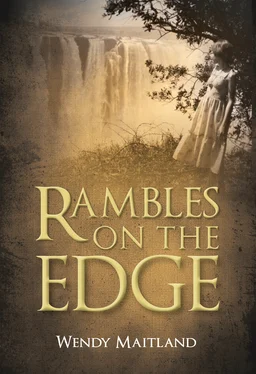1 ...6 7 8 10 11 12 ...16 There was nothing I could do about this, so I tried to be glad that she had found a solution to her loneliness, hoping that somehow it would turn out all right despite Mary’s warning.
Our new employer, Eric Hornby, was well known in Rhodesian farming circles with a Friesian herd of 380 milking cows on several thousand acres of prime land that produced a variety of crops, including cotton. The rich flat fields were ideal for crops or cattle raising, but did not provide a very arresting landscape. Looking out from our house in the bean field there were no scenic landmarks and most of the trees had been cleared. A few of these had been left to indicate a boundary between us and the smallholding of Thornby Farm next door, where Eric’s sister Hazel lived very frugally with her husband and five children. They ran a small market garden and farm store that struggled to generate an income, in contrast to Eric’s prosperous acres. Hazel and I became good friends as we combined what resources we had to help each other in these mutually barren circumstances.
There were compensations as life was peaceful and well-ordered in terms of government services like health, security and administration. We could not have imagined, just then, that our unremarkable district of Hartley would find itself in the front line of a brutal war within seven years, and that poor Hazel’s family would be decimated.
For now, our first day at Rogate was ominous in its own way as the glowering rain clouds that Simon and Peter had been watching from outside soon burst in a violent storm. A deluge fell onto the house and surrounding bean field while we were still moving in. Adam had just unrolled carpets and rugs to disguise the effect of concrete floors, and Louise was arranging her bedroom having made her bed and unpacked toys and clothes, when the storm erupted. There was no time to cover her chicken-wire window against incoming rain when she shouted, ‘My bed is getting soaked, and the carpet is floating away.’ It wasn’t just her bedside rug that had become waterborne; all the others, newly laid, were bobbing about in a tide of muddy water surging in under the front and back doors. The construction of the building had not included obvious essentials to avoid this problem. Were we expected to bring duck-boards with us I wondered in this new situation which was several notches down from the Maclean’s superior housing. All we could do was wait for the rain to stop, which it usually does abruptly in Africa, and then get to work with brooms and mops.
Milking times were at 3.30 am, 10 am and 3 pm. This intensive routine was designed for maximum milk production, but was punishing for the dairy workers, and for the cows as they got worn out and had shorter lives than when they were milked twice a day. After each milking there was the cooling process to supervise, sick animals to treat, cows lined up for AI, cows calving, outside herds of followers (young animals) for checking, bulls to be visited in their pens and calves in theirs, and then a good deal of office work. Adam would come home for breakfast at 9 am, and later for lunch, then not until 7.30 pm when the boys were in bed, but Louise was allowed to stay up to say goodnight to him. It was a demanding life, but there is a particular type of satisfaction in dairy farming that is difficult to explain to anyone who has not lived it. Cows have personalities and even in a big herd there are misfits and rebels: the canny ones looking to see how they can beat the system; others that are gently affectionate and charming; the younger ones who are curious and friendly, their noses outstretched enquiringly. The warm smell of these animals is comforting; the soft neck and flank of a cow at close quarters with the feel and scent of its body and that of hay or fresh grass has a soothing intimacy. Cows are vegetarians so their pats are nothing more obnoxious than chewed and digested plants. The relationship which develops between man, woman and beast in the steamy environment of milk production is a close and committed one. It can border on addiction, I used to think, as Adam’s dedication to this relentless routine had its frustrating times, such as weekends and Christmas in addition to the long working hours each day. He was supposed to have regular days off, but these were often spent catching up on office work. If it was an addiction then there was little hope that he might consider a change, I thought.
The children took all this as normal since they had known no other life, and the boys quickly made friends among the children of African workers on the farm, where they roamed free and came home looking as dirty and ragged as any other scamps met along the way. It would have shocked Muz, so I consoled myself that she had not come to view our fall from grace. Louise did not join the boys, preferring the friendship of Hazel’s daughters whom she joined at Hartley School and settled there without a qualm. It was a popular school, famed for its academic and sporting excellence, so this helped us to feel better about the various shortcomings in our situation. Rugby was almost a religion in Rhodesia and training for boys started at age five in the first form, which made Simon very impatient to start school and go off with Louise each morning. Meeting other parents was my own passport to making new friends and now that we were living close to a town, I thought the Anglican church might offer some opportunities for socialising.
On my first visit I took the children who had been scrubbed and put into decent clothes, but not decent enough for us to be ushered into pews near the front where the children could see what was going on. Ladies in hats and gloves showed us where we should sit, but when I noticed that the back rows were filled with Africans I decided to go and sit with them. ‘No, you can’t go there,’ the hat ladies said. ‘You can’t sit with blacks,’ and went on to insist that I accept the pew offered. Later, when communion was served, I saw that the Africans waited until everyone else had been served before they left their seats and came up to receive communion themselves. When I asked about this I was told that whites could not drink from the communion cup after blacks, so whites went first. This made me decide to make a point of joining the Africans for communion next time. This is the church of Christ where we are all one body, I thought. What is going on here?
Despite this form of apartheid practised at the church I wanted to persevere because the hat ladies were all passionate cooks who gave phenomenal tea parties organised by a large bouncy woman called Elsa. She might easily have been a model for Beryl Cook postcards if she had not ended up in the obscurity of Hartley, where her tiny short-sighted husband worked for the local cotton ginnery. Elsa had a refreshing view of Christianity in which any occasion that encouraged the eating of vast quantities of food could be counted as an a blessing received from above. ‘I don’t have to worry about dieting,’ Elsa explained, ‘because I say a prayer with each meal asking Jesus to take away the calories.’ I looked at her generous bulk overflowing the chair as she reached for another slice of cake. ‘Does it work?’ I asked, making the question sound innocent. ‘Of course it does – if you have faith,’ Elsa said. ‘Maybe not straight away. You have to be patient. Jesus works in mysterious ways. It’s a promise from the Bible.’
Another of these prodigious tea parties was given by a church member whose husband was a senior manager at the ginnery, with the kind of salary that allowed his wife to indulge her tastes in home décor. At the party I was admiring her new curtains, which clearly had not come from the local textile factory, when she said she would be glad to tell me how to find the best ones as her method never failed. I was curious to hear it, and she went on: ‘When I’m in a curtain shop in Salisbury looking at all the designs on display, I ask God to choose.’
Читать дальше












